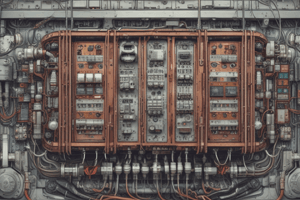Podcast
Questions and Answers
What are the main components of building electrical systems?
What are the main components of building electrical systems?
Service Entrance, Circuit Breakers or Fuses, Wiring, Outlets and Switches, Lighting Fixtures, Grounding
What is the purpose of circuit breakers or fuses in building electrical systems?
What is the purpose of circuit breakers or fuses in building electrical systems?
- To illuminate the building
- To distribute electricity to various parts of the building
- To protect electrical circuits from overloads or short circuits (correct)
- To provide a place to plug in devices
Grounding prevents electrical shocks by directing excess electricity towards people.
Grounding prevents electrical shocks by directing excess electricity towards people.
False (B)
Electricity is supplied from the utility company and enters the building through the ______.
Electricity is supplied from the utility company and enters the building through the ______.
What can happen if too many devices are plugged into a single outlet?
What can happen if too many devices are plugged into a single outlet?
What should you do when in doubt about electrical issues?
What should you do when in doubt about electrical issues?
What is one of the safety measures mentioned for building electrical systems?
What is one of the safety measures mentioned for building electrical systems?
Flashcards are hidden until you start studying
Study Notes
Main Components
- Service Entrance: Initial point where electricity enters a building, includes the service panel or circuit breaker box for distribution.
- Circuit Breakers or Fuses: Safety devices that cut off power during overloads or short circuits to protect circuits.
- Wiring: Transports electricity from the service panel to outlets and switches, typically concealed within walls, ceilings, and floors.
- Outlets and Switches: Outlets allow connection of electrical devices; switches control electric flow to lighting and fixtures.
- Lighting Fixtures: Various sources such as ceiling lights, wall sconces, and lamps that provide illumination within a building.
- Grounding: A safety feature directing excess electricity away, reducing the risk of electrical shocks.
How It Works
- Power Supply: Electricity is sourced from utility companies and enters through the service entrance.
- Distribution: The service panel distributes the electricity into multiple circuits, each safeguarded by circuit breakers or fuses.
- Usage: Electric current flows through wiring to outlets, switches, and fixtures, powering devices and providing illumination.
- Safety Measures: Circuit breakers and grounding work together to ensure the system operates safely, protecting individuals and property.
Common Issues
- Overloading: Occurs when excessive devices are plugged into one outlet, leading to potential outages or fire hazards.
- Faulty Wiring: Old or damaged wiring increases the risk of safety incidents, including the risk of fire.
- Tripped Breakers: Frequent breaker trips may indicate underlying electrical issues needing professional evaluation.
Maintenance and Safety Tips
- Regular Inspections: Periodic evaluations by a licensed electrician help ensure the electrical system is functioning safely and efficiently.
- Use Proper Equipment: Always utilize well-maintained electrical devices rated for appropriate voltage to prevent hazards.
- Avoid DIY Repairs: Potential dangers of electrical work make it advisable to hire qualified electricians for repairs or upgrades.
Studying That Suits You
Use AI to generate personalized quizzes and flashcards to suit your learning preferences.




